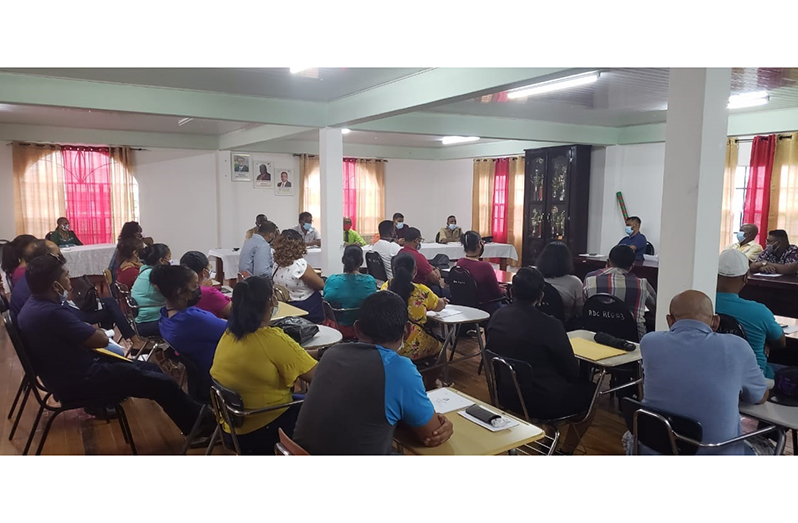SIXTY-THREE owners and managers of restaurants, bars and rum shops were urged to adhere to the national guidelines to keep the pandemic at bay during a meeting with Region Three COVID-19 Task Force on Tuesday. The meeting was held at the Regional Democratic Council’s boardroom Issues raised centred on the role of the regional administration and the police; tips on safety precautions; enforcement of COVID-19 restrictions; social distancing; curfew time; food handlers’ certificates; playing of loud music to disturb the neighbourhood and the danger in failing to adhere to the gazetted COVID guidelines. The meeting was chaired by Regional Chairman Sheikh Ayube Inshan and brief remarks were made by Divisional Commander Senior Superintendent Errol Watts. The commander pinpointed areas of concern by the police and the role of law enforcement as it relates to breaches of COVID-19 restrictions.
Brief remarks were also made by Regional Vice-Chairman, Omesh Satyanand; Regional Coordinator, Halim Khan and Deputy Commander Superintendent Boodnarine Persaud.
All those who attended were also given copies of the gazetted order made by the Health Ministry. In an invited comment, Regional Coordinator Halim Khan explained that an effective response to the pandemic will be successful, only if people voluntarily follow the rules and guidelines of decision-makers and experts. “Many of the required measures such as avoiding social contact and significantly changing our daily habits require a strong commitment. Other necessary actions, such as regular hand- washing, are often impossible to monitor and enforce. Adherence to the guidelines thus depends on people’s personal commitment,” the regional coordinator explained. Khan said the ability of policymakers and experts to communicate convincingly to citizens has a strong influence on whether people voluntarily motivate themselves to change their behaviours and maintain new behaviours.
Further, he noted that social dialogue also makes a crucial contribution to improving workplace health and safety by supporting the effective enforcement of agreed measures and standards.
The regional coordinator advised the public that the risks of getting COVID-19 are higher in crowded and inadequately ventilated spaces where infected people spend long periods of time together in proximity. These environments, Khan said, are where the virus appears to be spread more efficiently by respiratory droplets or aerosols, so taking precautions is even more important. “Know the full range of symptoms of COVID-19. The most common symptoms of COVID-19 are fever, dry cough, and tiredness. Other symptoms that are less common and may affect some patients include loss of taste or smell, aches and pains, headache, sore throat, nasal congestion, red eyes, diarrhoea, or a skin rash,” he said. He continued: “Stay home and self-isolate, even if you have minor symptoms such as coughing, headache, mild fever, until you recover. Call your health care provider or hotline for advice. Have someone bring you supplies. If you need to leave your house or have someone near you, wear a medical mask to avoid infecting others. If you have a fever, cough and difficulty breathing, seek medical attention immediately. Call by telephone first if you can and follow the directions of your local health authority.”




.png)









